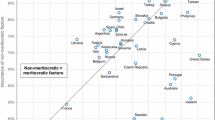Abstract
Public scholarship is an emerging pedagogical practice that integrates teaching, research, and service in ways that expand student learning by tackling critical, topical problems and generating real solutions. This paper describes the use of a course on women and the economy in two widely disparate institutions to demonstrate the process of integrating public scholarship in economics.
Similar content being viewed by others
Notes
According to a recent survey by Campus Compact (http://www.compact.org/news/story/528) and the National Survey of Student Engagement (http://nsse.iub.edu/index.cfm)
The Association for Social Economics Website, http://www.socialeconomics.org/, accessed November 1, 2007
The Economics of Women, Men and Work, Fifth Edition, by Francine D. Blau, Marianne A. Ferber and Anne E. Winkler
Students were asked to respond “Strongly Disagree,” “Somewhat Disagree,” “Somewhat Agree,” or “Strongly Agree” to the following seven statements: 1. I increased my understanding of how to use my own knowledge and skills to improve the community, 2. I increased my understanding of how to use course readings and information to gain insight into community issues, 3. I increased my understanding of how my college education can benefit both me and the community, 4. I am now more likely to complete my college degree, 5. I am now more likely to involve myself in community service in the future, 6. I now see myself as having the capacity to become a community leader, 7. I now see myself as having the capacity to create positive community change
The Economics of Women, Men and Work, Fifth Edition, by Francine D. Blau, Marianne A. Ferber and Anne E. Winkler
References
Becker, W. E., & Watts, M. (1996). Chalk and talk: a national survey on teaching undergraduate economics. American Economic Review, 86, 448–453.
Becker, W. E., & Watts, M. (1997). Teaching economics to undergraduates. Journal of Economic Literature, 35, 1347–1373.
Becker, W. E., & Watts, M. (eds). (1998). Teaching economics to undergraduates–Alternatives to chalk and talk. Edward Elgar: Northampton MA.
Becker, W. E., & Watts, M. (2001). Teaching economics at the start of the 21st century: Still chalk and talk. American Economic Review, 91, 446–452.
Becker, W. E. & Watts, M. (2007). A little more than chalk and talk: Results from a third national survey of teaching methods in undergraduate economics courses. Retrieved March 25, 2008, from http://mypage.iu.edu/~beckerw/working_papers.htm
Bransford, J. D., Brown, A. L., & Cocking, R. R. (eds). (2000). How people learn: Brain, mind, experience, and school (expanded edition). Washington, D.C.: National Academy.
Francis, M. C., Mulder, T., & Stark, J. S. (1995). Intentional learning: A process of learning to learn in the accounting curriculum. Accounting Education Change Commission and the American Accounting Association. Retrieved March 25, 2008, from http://aaahq.org/AECC/intent/cover.htm
McGoldrick, K. (1998). Service-learning in economics: a detailed application. Journal of Economic Education, 29(4), 365–376.
McGoldrick, K., & Ziegert, A. (eds). (2002). Putting the invisible hand to work: Concepts and models of service learning in economics. Ann Arbor: The University of Michigan Press.
O’Boyle, E. J. (1999). Teaching the social economics way of thinking: Selected papers from the ninth world congress of social economics. Lewiston, N.Y: The Edwin Mellen Press.
Wharton-Michael, P., Janke, E. M., Karim, R., Syvertsen, A. K., & Wray, L. D. (2006). An explication of public scholarship objectives. In R. A. Eberly & J. Cohen (Eds.), A laboratory for public scholarship and democracy. New Directions for Teaching and Learning, No 105, pp. 63–72. San Francisco: Jossey-Bass.
Yapa, L. (2006). Public scholarship in a post-modern university. In R. A. Eberly & J. Cohen (Eds.), A laboratory for public scholarship and democracy. New Directions for Teaching and Learning, No 105, pp. 73–83.
Author information
Authors and Affiliations
Corresponding author
Rights and permissions
About this article
Cite this article
McGoldrick, K., Peterson, J. Public Scholarship and Economics: Engaging Students in the Democratic Process. For Soc Econ 38, 229–245 (2009). https://doi.org/10.1007/s12143-009-9036-y
Received:
Accepted:
Published:
Issue Date:
DOI: https://doi.org/10.1007/s12143-009-9036-y



